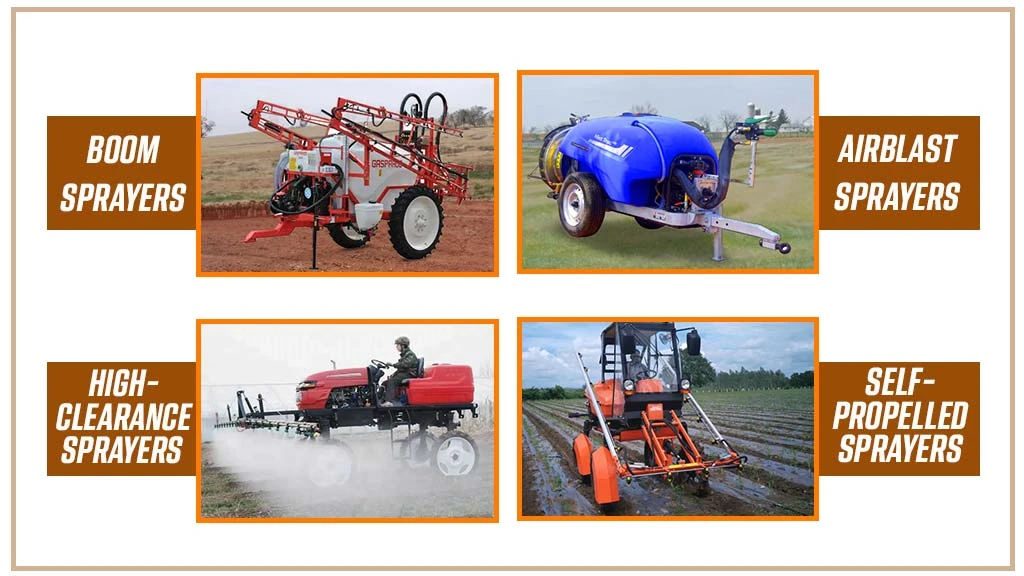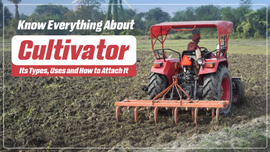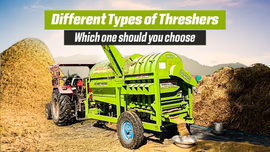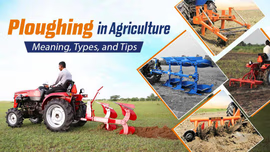The Ultimate Tractor Sprayer Guide: From Types to Safety Tips

A tractor sprayer is a farm implement used to apply chemicals in the liquid form to control insects, pests and diseases. Sprayers are available in different types, which include boom sprayers, airblast sprayers, high-clearance sprayers, and self-propelled sprayers. The benefits of using tractor sprayers are that they minimize labour costs and increase crop production.
Table of Content
- Introduction
- Which are the major types of Tractor Sprayers?
- What are the benefits of using a Tractor Sprayer?
- Which are the popular models of Tractor Sprayer?
- Choosing the Right Tractor for Sprayer
- What Safety Precautions should be taken while operating Tractor Sprayers?
Introduction
A sprayer is a machine used to atomise liquid chemicals and spray the chemical at the plants uniformly. Sprayers are used in farming to apply pesticides, herbicides, and fertilizers to agricultural crops. Sprayers are available in different sizes, from man-portable units, typically backpack and spray guns, to tractor-mounted and self-propelled units. They are a great way to reduce labour costs, and they ensure that pesticides or medicines are applied uniformly on the farms and protect the crops from insects and diseases.
Which are the major types of Tractor Sprayers?

Boom Sprayers
These sprayers are equipped with long booms that extend horizontally and cover large ground efficiently. They are operated using mini tractors and are suitable for spraying chemicals like pesticides, herbicides, and fertilizers.
Airblast Sprayers
Airblast sprayers are the most used sprayers in the agriculture sector. They are commonly used in orchard farming and vineyards. These sprayers are equipped with a powerful fan, which produces a high-pressure air stream. This air stream atomizes the spray chemical and propels it onto the crops in the field. It provides uniform coverage even in dense foliage.
High-clearance Sprayers
These sprayers have a high ground clearance and are specially designed to navigate over tall crops, such as wheat and corn. Their spray nozzles are adjustable, ensuring precise spraying of chemicals or fertilizer to the target regions.
Self-Propelled Sprayers
These sprayers come with their own power source and don’t need a tractor to operate. They have large tanks for storing the spray chemicals. The self-propelled sprayers provide flexibility and manoeuvrability, which makes them an ideal choice for large-scale and small-scale spraying operations.
What are the benefits of using a Tractor Sprayer?
- The primary benefit is they reduce labour costs as they are twice as efficient as manual sprayers.
- They are used to apply pesticides and fertilizers uniformly.
- They are a cost-effective solution for spraying chemicals in the field, as they need minimum effort and time.
- They eliminate the need for manual spraying and save time and labour, providing more efficient work.
- They are easy to use and can be attached to a wide range of mini tractors easily.
Which are the popular Tractor Sprayer models in India?
|
Model |
Type |
Required Tractor HP |
Spray Tank Capacity (litres) |
|
Tractor Operated |
30+ |
650 |
|
|
Tractor Operated |
30+ |
400 |
|
|
Self-Propelled |
22+ |
900 |
|
|
Self-Propelled |
25+ |
600 |
Choosing the Right Tractor for Sprayers
Mini tractors are perfect for operating sprayers in India. Generally, a mini tractor within the range of 24 to 36 HP is the best for operating a sprayer. A mini tractor with a 4-wheel drive, small turning radius, and high PTO power can be a suitable choice for operating a sprayer. Some mini tractor models best suited for operating sprayers are:
- Kubota Neostar B2741S
- Mahindra 305 DI Orchard
- John Deere 3028 EN
- Farmtrac Atom 26
- Mahindra Oja 3132 4WD
- VST Shakti MT 270 Viraat 4WD Plus
What safety precautions should be taken while operating tractor sprayers?
- Take the ideal amount of pesticide for the day’s application from the storage to the field.
- Ensure pesticides are mixed in the right quantities.
- Put on proper clothing and avoid skin contamination, especially the mouth and eyes.
- Make sure you are not spraying in high wind, rain, and high temperature. Do not spray if the wind is blowing towards grazing livestock or pastures used regularly.
- Ensure you are following the right spraying technique and spray crops thoroughly by operating the tractor sprayer at the right speed and correct pressure.
- Do not allow children or any unauthorized person in that area during the mixing of pesticides.
- Do not leave pesticides unattended at the farm.


Related Blogs












